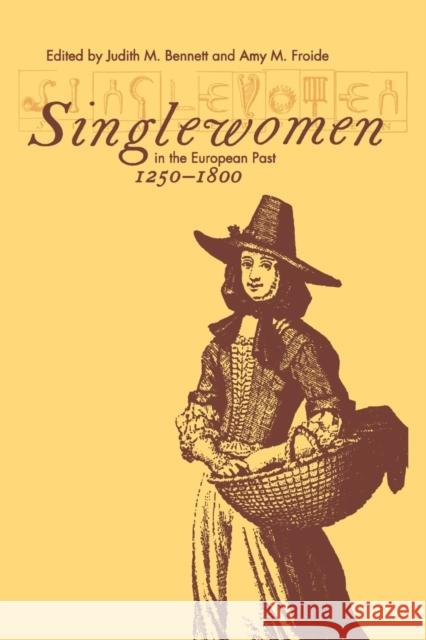Singlewomen in the European Past, 1250-1800 » książka
Singlewomen in the European Past, 1250-1800
ISBN-13: 9780812216684 / Angielski / Miękka / 1998 / 360 str.
When we think about the European past, we tend to imagine villages, towns, and cities populated by conventional families--married couples and their children. Although most people did marry and pass many of their adult years in the company of a spouse, this vision of a preindustrial Europe shaped by heterosexual marriage deceptively hides the well-established fact that, in some times and places, as many as twenty-five percent of women and men remained single throughout their lives. Despite the significant number of never-married lay women in medieval and early modern Europe, the study of their role and position in that society has been largely neglected. Singlewomen in the European Past opens up this group for further investigation. It is not only the first book to highlight the important minority of women who never married but also the first to address the critical matter of differences among women from the perspective of marital status. Essays by leading scholars--among them Maryanne Kowaleski, Margaret Hunt, Ruth Mazo Karras, Susan Mosher Stuard, Roberta Krueger, and Merry Wiesner--deal with topics including the sexual and emotional relationships of singlewomen, the economic issues and employment opportunities facing them, the differences between the lives of widows and singlewomen, the conflation of singlewomen and prostitutes, and the problem of female slavery. The chapters both illustrate the roles open to the singlewoman in the thirteenth through eighteenth centuries and raise new perspectives about the experiences of singlewomen in earlier times. "An exemplary contribution to the history of women. . . . All of the essays pay admirable attention to the variety of unmarried women's experiences."--Choice "This collection calls our attention both to the way historians have ignored one particular group and to the costs of having done so. The essays are rich with interesting detail, balanced and nuanced in argument, and filled with provocative challenges to our assumptions about how singlewomen interpreted their situations."--Martha Howell, Columbia University Judith M. Bennett is Professor of History at the University of Southern California. She is the author, most recently, of History Matters: Patriarchy and the Challenge of Feminism, also available from the University of Pennsylvania Press. Amy M. Froide teaches history at Miami University of Ohio. She is completing a book on singlewomen in early modern England.
When we think about the European past, we tend to imagine villages, towns, and cities populated by conventional families--married couples and their children. Although most people did marry and pass many of their adult years in the company of a spouse, this vision of a preindustrial Europe shaped by heterosexual marriage deceptively hides the well-established fact that, in some times and places, as many as twenty-five percent of women and men remained single throughout their lives.Despite the significant number of never-married lay women in medieval and early modern Europe, the study of their role and position in that society has been largely neglected. Singlewomen in the European Past opens up this group for further investigation. It is not only the first book to highlight the important minority of women who never married but also the first to address the critical matter of differences among women from the perspective of marital status.Essays by leading scholars--among them Maryanne Kowaleski, Margaret Hunt, Ruth Mazo Karras, Susan Mosher Stuard, Roberta Krueger, and Merry Wiesner--deal with topics including the sexual and emotional relationships of singlewomen, the economic issues and employment opportunities facing them, the differences between the lives of widows and singlewomen, the conflation of singlewomen and prostitutes, and the problem of female slavery. The chapters both illustrate the roles open to the singlewoman in the thirteenth through eighteenth centuries and raise new perspectives about the experiences of singlewomen in earlier times."An exemplary contribution to the history of women. . . . All of the essays pay admirable attention to the variety of unmarried women's experiences."--Choice"This collection calls our attention both to the way historians haveignored one particular group and to the costs of having done so. The essays are rich with interesting detail, balanced and nuanced in argument, and filled with provocative challenges to our assumptions about how singlewomen interpreted their situations."--Martha Howell, Columbia UniversityJudith M. Bennett is Professor of History at the University of Southern California. She is the author, most recently, of History Matters: Patriarchy and the Challenge of Feminism, also available from the University of Pennsylvania Press. Amy M. Froide teaches history at Miami University of Ohio. She is completing a book on singlewomen in early modern England.











